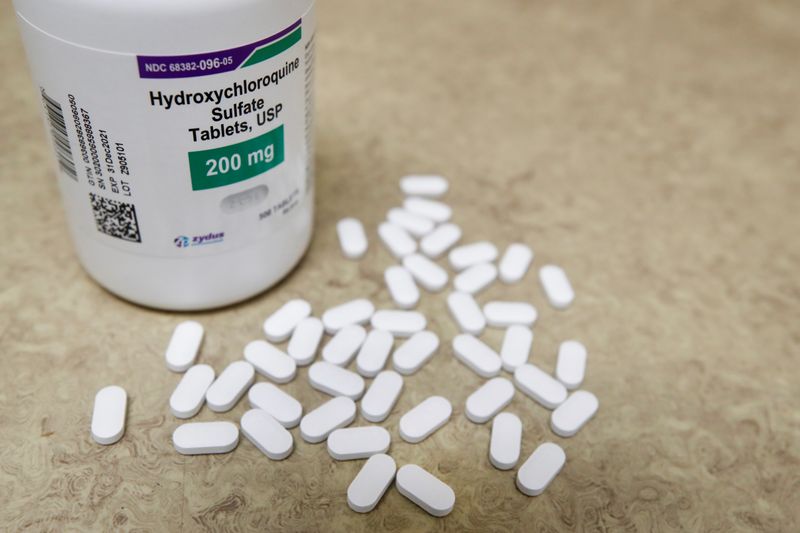By Nancy Lapid
(Reuters) - The following is a roundup of some of the latest scientific studies on the novel coronavirus and efforts to find treatments and vaccines for COVID-19, the illness caused by the virus.
Combining trial data suggests hydroxychloroquine benefit
In a series of randomized controlled trials, the malaria drug hydroxychloroquine did not show a statistically significant impact on the prevention or treatment of COVID-19. But when data from five of those trials were combined, researchers found that early use of the drug by people who were not hospitalized yielded a statistically significant 24% reduction in risk of infection, hospitalization or death. "The meta-analysis pools together the studies and increases statistical power," said Dr. Joseph Ladapo of the David Geffen School of Medicine at UCLA, coauthor of a report posted on Wednesday on medRxiv ahead of peer review. But a weakness of the meta-analysis, Ladapo acknowledged, is that infections, hospitalizations and deaths were grouped together into a "composite outcome." Combining all those events into one big number makes it more likely researchers will find that treatment had a significant effect. Coauthor Dr. Harvey Risch of the Yale School of Public Health noted that seven nonrandomized controlled trials have also shown "statistically significant reduced risks with early outpatient use of hydroxychloroquine." Along with the meta-analysis, he told Reuters, "This is extremely strong evidence of benefit." (https://
COVID-19 tricks body into attacking blood-clotting proteins
The excessive blood clotting seen in severe COVID-19 may in part be caused by the virus tricking the body into attacking itself. In patients with severe cases of the virus, the immune system produces high levels of a type of antibody that mistakenly attacks important proteins called phospholipids, which help keep blood from clotting, researchers say. In a study of 64 COVID-19 patients published on Wednesday in Clinical Infectious Diseases, those with severe disease consistently had more antiphospholipid antibodies than those with mild disease, regardless of gender or age. "Our data strongly suggest that when our body fights the new coronavirus in our lungs, it also starts to fight its own proteins that keep our blood from clotting," coauthor Dr. Omar Hasan Ali of The University of British Columbia told Reuters. This problem has been seen before, in a rare autoimmune disease called antiphospholipid syndrome that is usually triggered by infections. (https://
CPR usually unsuccessful for COVID-19 cardiac arrests
Cardiac arrests are common among critically ill COVID-19 patients but cardiopulmonary resuscitation (CPR) is usually unsuccessful. On Monday in JAMA Internal Medicine, Michigan doctors reported that among 54 hospitalized COVID-19 patients who suffered cardiac arrests, none survived. A separate study published on Wednesday in The BMJ found that among 701 COVID-19 patients who had cardiac arrests, CPR was attempted in slightly more than half; the others had "do not resuscitate" orders in place. Only 48 cardiac arrest patients left the hospital alive, and only 28 did so with normal or mildly impaired brain function. Survival odds were the lowest for older patients and for patients whose heart could not be quickly restarted. Most arrests involved "unshockable rhythms," which means the heart cannot respond to electric shocks from a defibrillator. Dr. Dilip Khanal of Beaumont Health System, coauthor of the Michigan study, told Reuters, "While it is not possible to make blanket recommendations ... this type of information should help patients and family to make informed choices" about whether to attempt CPR for a cardiac arrest. His team said research is needed to determine the benefit of prolonged CPR efforts on COVID-19 patients who are not responding, given that the process "generates aerosols that may place health care personnel at a higher risk of contracting the virus." (https:// https://
Open https://tmsnrt.rs/3a5EyDh in an external browser for a Reuters graphic on vaccines and treatments in development.
